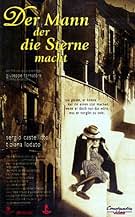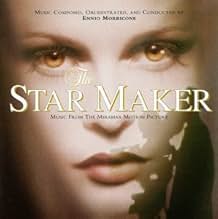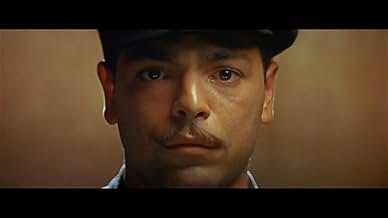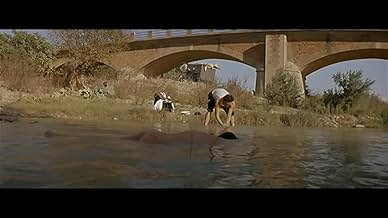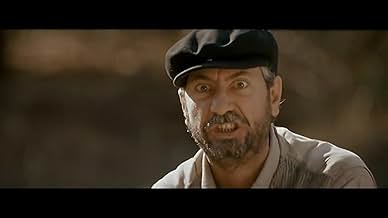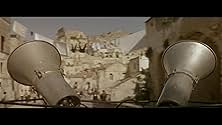NOTE IMDb
7,3/10
5,7 k
MA NOTE
Joe Morelli, parcourt les villages de Sicile à la recherche de nouveaux talents pour le cinéma, proposant aux villageois un bout d'essai, leur faisant miroiter richesse et célébrité. En fait... Tout lireJoe Morelli, parcourt les villages de Sicile à la recherche de nouveaux talents pour le cinéma, proposant aux villageois un bout d'essai, leur faisant miroiter richesse et célébrité. En fait, il les escroque en profitant de leur crédulité.Joe Morelli, parcourt les villages de Sicile à la recherche de nouveaux talents pour le cinéma, proposant aux villageois un bout d'essai, leur faisant miroiter richesse et célébrité. En fait, il les escroque en profitant de leur crédulité.
- Réalisation
- Scénario
- Casting principal
- Nommé pour 1 Oscar
- 13 victoires et 16 nominations au total
Avis à la une
Emotions of enthusiasm break down in sensitive portraits of poor Sicilians who reveal their inner self in two minutes they have in front of a camera. Realism all the way and yet i had to think of the enthusiasm Kusturica had in Black Cat White Cat although none of the characters are that absurd. If you see European movies like this after all the American commercial rubbish you get a glimpse of what film can give us! Good acting and writing, beautiful locations, a lot of strong character studies and very, very impressive camera work. Absolutely not a waste of your time!
Tornatore did to me with this movie what he failed to do with "Cinema Paradiso". I used to blame myself for being insensitive comparing to people's reactions after "Cinema Paradiso" but now after this movie I know that it's not me, but the "virgin" audience in good movies that overreacted.
The Starmaker is simply Perfect. The Mute's scene deserved an Oscar by itself. As a mater of fact every scene in the movie was so cinematographic that could have been easily a short movie by itself. As for the New York Times comments on the movie...... what do you expect by critiques who hailed "Shakespeare In Love". People have to understand that the old critiques of NYT that actually knew more than we do about movies are not around anymore! 11out of 10
The Starmaker is simply Perfect. The Mute's scene deserved an Oscar by itself. As a mater of fact every scene in the movie was so cinematographic that could have been easily a short movie by itself. As for the New York Times comments on the movie...... what do you expect by critiques who hailed "Shakespeare In Love". People have to understand that the old critiques of NYT that actually knew more than we do about movies are not around anymore! 11out of 10
A seemingly heartless con-man (Sergio Castellito) goes around post-World War II Sicily filming most everyone, for a price, and leads villagers to believe that he is a talent scout for a film studio. Naturally many flock to the apparently kind stranger and do what they can to escape lives of poverty and unhappiness. Castellito meets up with many vivid characters, but none more so than the beautiful Tiziana Lodato (in her first screen role). Soon the young lady is begging Castellito to take her to the land of movie-making and in the process he falls in love with her and acquires a conscience. Apparently he may change his ways and then again maybe not, but it becomes very clear that the local authorities may catch up to Castellito before the film runs its course. "The Star Maker" was a Best Foreign Language Film nominee at the Academy Awards in 1995. Co-written and directed by horribly under-rated Italian film-maker Giuseppe Tornatore (who struck Foreign Language Oscar gold in 1989 with "Cinema Paradiso", one of my all-time favorite pictures), "The Star Maker" is a flawed work because of a strange tone that makes it an uneven experience at times. Humorous situations early point the way to a free-wheeling comedy, but soon drama sneaks in and by the end the drama has literally chased the early comedic routines away. The performers come and go, but Lodato's appearance about half-way through was enough to put the movie over the top. She just shines in a film of illuminated darkness and ultimately steals the show from Castellito by the heart-breaking finale. Tornatore was able to grab everyone with "Cinema Paradiso". Regardless of whether you liked that film or not, you should have cared for the primary characters. "The Star Maker" is a little more difficult in that regard. It holds its audience at arm's length most of the time and almost never hugs as tight as it should have. The final haunting scenes are reminiscent of the emotionally-charged montage to the magic of motion pictures in "Cinema Paradiso" and thankfully by that point most everything was presented well enough to make "The Star Maker" an important and worthy addition to the Italian world of films. 4.5 out of 5 stars.
Joe Morelli (Sergio Castellitto) is a flimflam man who is driving around the rural villages of Sicily shortly after World War II selling potential stardom for fifteen hundred lira. He has a motion picture camera and loudspeaker on his truck. As he drives through the villages he broadcasts to the people that he is from the film industry of Roma and he is giving screen tests in order to discover natural talent.
He sets up his truck and tent typically in the town square. His technique is to tell everyone that they have a wonderful face, hidden talent, that they are naturals and diamonds in the rough. He hands out fliers with some dialogue from "Gone with the Wind" on them that they should practice reading before appearing before his camera. He has discovered that people will fall for his flattery and pay him for the fake screen tests.
As we watch the film we discover that people will put their hearts and souls into the experience of appearing before his camera. They don't just read the lines from Gone with the Wind. They tell their life stories in miniature. They bare their hearts and souls to the flimflam man in the hope that someone will hear and see their anguish, their pain, their experience. To Morelli, who has been to Hollywood and failed, this is just a way to make a lira. He has a gift for the hustle and is blind to the real emotion that he evokes.
A woman believes his teenaged daughter has the talent to make it in the movies. She begs Morelli to take her to Roma. She even has sex with him and promises to allow him to be her daughter's first lover. But Morelli moves on to the next town. He is stopped by the local police chief, but Morelli manages to flatter him into appearing before his camera and then applauds the chief's performance. Three highwaymen stop to rob Morelli. He is able to convince them that Roma longs for their raw talent. And so on, as he travels over the cobblestones and over the winding roads.
Finally he meets beautiful Beata (Tiziana Lodato) who is 15 or 18. She isn't sure. She works in the convent, bathing the sick and scrubbing the floors. She exposes herself to the local tax man to raise the 1500 lira needed for Morelli's screen test. She is strikingly beautiful from head to toe, and the tax man exclaims, "You are a statue!" when he sees her body. Morelli is reluctant to get involved with someone so young even though she throws herself at him.
What happens after this I will not say since it would spoil the film for those who have not seen it. But watch for the con man to get conned, among other things. Despite his villainy, there is a sense that Morelli is a man that we can identify with and understand. I think it is this quality that director Giuseppe Tornatore has developed in his character that carries the film, and Sergio Castellitto whom I saw recently in Non ti muovere (Don't Move) (2004) really becomes the part.
Tornatore, who made a splash with the critically acclaimed Cinema Paradiso (1988) wrote the original material here and worked on the script in addition to directing. While I thought Cinema Paradiso was an excellent film, I liked this one even more. Both are original works of art, but I found L'uomo delle stelle more engaging. Particularly striking are the beautiful village scenes, the faces of the people, and the photography of the Sicilian countryside and ruins.
(Note: Over 500 of my movie reviews are now available in my book "Cut to the Chaise Lounge or I Can't Believe I Swallowed the Remote!" Get it at Amazon!)
He sets up his truck and tent typically in the town square. His technique is to tell everyone that they have a wonderful face, hidden talent, that they are naturals and diamonds in the rough. He hands out fliers with some dialogue from "Gone with the Wind" on them that they should practice reading before appearing before his camera. He has discovered that people will fall for his flattery and pay him for the fake screen tests.
As we watch the film we discover that people will put their hearts and souls into the experience of appearing before his camera. They don't just read the lines from Gone with the Wind. They tell their life stories in miniature. They bare their hearts and souls to the flimflam man in the hope that someone will hear and see their anguish, their pain, their experience. To Morelli, who has been to Hollywood and failed, this is just a way to make a lira. He has a gift for the hustle and is blind to the real emotion that he evokes.
A woman believes his teenaged daughter has the talent to make it in the movies. She begs Morelli to take her to Roma. She even has sex with him and promises to allow him to be her daughter's first lover. But Morelli moves on to the next town. He is stopped by the local police chief, but Morelli manages to flatter him into appearing before his camera and then applauds the chief's performance. Three highwaymen stop to rob Morelli. He is able to convince them that Roma longs for their raw talent. And so on, as he travels over the cobblestones and over the winding roads.
Finally he meets beautiful Beata (Tiziana Lodato) who is 15 or 18. She isn't sure. She works in the convent, bathing the sick and scrubbing the floors. She exposes herself to the local tax man to raise the 1500 lira needed for Morelli's screen test. She is strikingly beautiful from head to toe, and the tax man exclaims, "You are a statue!" when he sees her body. Morelli is reluctant to get involved with someone so young even though she throws herself at him.
What happens after this I will not say since it would spoil the film for those who have not seen it. But watch for the con man to get conned, among other things. Despite his villainy, there is a sense that Morelli is a man that we can identify with and understand. I think it is this quality that director Giuseppe Tornatore has developed in his character that carries the film, and Sergio Castellitto whom I saw recently in Non ti muovere (Don't Move) (2004) really becomes the part.
Tornatore, who made a splash with the critically acclaimed Cinema Paradiso (1988) wrote the original material here and worked on the script in addition to directing. While I thought Cinema Paradiso was an excellent film, I liked this one even more. Both are original works of art, but I found L'uomo delle stelle more engaging. Particularly striking are the beautiful village scenes, the faces of the people, and the photography of the Sicilian countryside and ruins.
(Note: Over 500 of my movie reviews are now available in my book "Cut to the Chaise Lounge or I Can't Believe I Swallowed the Remote!" Get it at Amazon!)
The Star Maker tells such a simple story that I was puzzled as to why its emotional impact grew long after I had seen it. It relates a series of encounters of con man `Dottore' Joe Morelli (Sergio Castellitto) with his marks. Like all con men, he sells dreams, in this case dreams of stardom, and some of the emotional power derives from the universal appeal of this con. In part the power lies in the cinematography of contrast and illusion. The contrast of the physical beauty of Sicily with its poverty alone is sufficient to grab your attention. But the most powerful contrast is seen in the faces of the Sicilians during their screen tests. Giuseppe Tornatore magically captures the hopes and the desperations of his would-be stars as they appear before the `Dottore's' camera. They have two minutes to sell themselves and to escape their destiny of poverty and capture their life's ambitions. Then there is the hero's moral dilemma. This is an `everyman' story; `il Dottore' is another poor guy who does what he can just to get by. He grabs our sympathy by demonstrating sympathy for his marks and by making some exceptional decisions along his way. While I was watching, it appeared to be no more that a series of loosely connected tales. Soon afterwards, the complexity and the moral strengths of the tale grew on me and continue to pleasantly persist.
Le saviez-vous
- AnecdotesTiziana Lodato's debut. She has full nude scenes and when filming began (september 1994), she was still a minor. But she said she was already 18 when she played the explicit sex scene with Sergio Castellitto. However her mother was upset. "She absolutely did not want me to make the film, although everyone reassured her by telling her Tornatore is an important director, he won the 'Oscar', but she did not give a damn. She said: my daughter's nude scenes, no. In the end I convinced her," Lodato said.
- Citations
Joe Morelli: We are here to offer you a fantastic future!
Meilleurs choix
Connectez-vous pour évaluer et suivre la liste de favoris afin de recevoir des recommandations personnalisées
- How long is The Star Maker?Alimenté par Alexa
Détails
- Date de sortie
- Pays d’origine
- Langues
- Aussi connu sous le nom de
- The Star Maker
- Lieux de tournage
- Poggioreale, Sicily, Italie(ghost town)
- Sociétés de production
- Voir plus de crédits d'entreprise sur IMDbPro
Box-office
- Montant brut aux États-Unis et au Canada
- 371 674 $US
- Week-end de sortie aux États-Unis et au Canada
- 40 915 $US
- 10 mars 1996
- Montant brut mondial
- 371 674 $US
Contribuer à cette page
Suggérer une modification ou ajouter du contenu manquant


